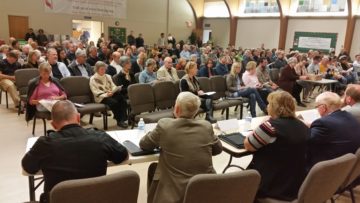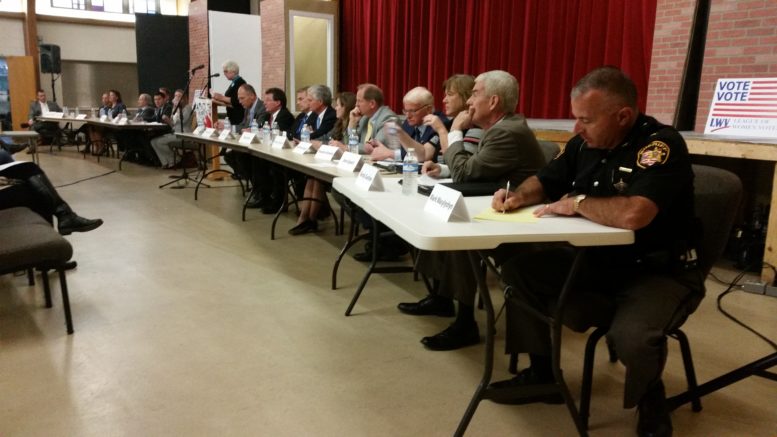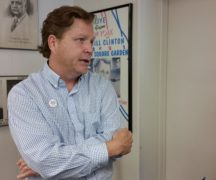By JAN LARSON McLAUGHLIN
BG Independent News
As the nation was preparing for the second presidential debate Sunday evening, Wood County residents filled up seats in a Bowling Green church to listen to local candidates.
Though the forum was much less contentious than the presidential debate, there were a few accusations lodged at the local level.
The League of Women Voters from Bowling Green and Perrysburg hosted the candidate forum for nine county, state and national races. Questions for the forum were accepted from the audience on note cards ahead of the event. But because there were 17 candidates sharing the stage, only two questions were posed to each. The candidates were all given a couple minutes to sum up at the end.
The biggest sparks flew when the candidates for the Ohio House – Republican Theresa Gavarone and Democrat Kelly Wicks – were called to the microphones. The first question asked each to identify their top two priorities.
But in response to multiple flyers mailed to local residents and a television commercial accusing Wicks of not paying his taxes, Wicks took the opportunity to set the record straight.
“I’m Kelly Wicks and I pay my taxes,” he said. Several years ago, he missed the deadline for a property tax payment, but paid it as soon as he realized the error, Wicks said. He questioned why his opponent and the state Republican party were spending so much on untruths.
“Why is she willing to go so ugly, so early?” Wicks said. “What are you hiding?”
Gavarone said she did not review the ads against her opponent. “They were produced out of Columbus and mailed out of Columbus.”
She also stated her top priorities would be the economy and education. “It’s important to keep Wood County working,” Gavarone said, suggesting the need to reduce taxes and regulations on businesses. Schools need to be funded adequately and the concerns of educators need to be heard, she said.
The second question for the House candidates was about charter schools and the need to make them accountable financially and in terms of student progress.
Gavarone said recent legislation is making charter schools more accountable, but added “we need to stay vigilant.”
Wicks voiced a much different opinion. “I’m against charter schools,” he said. “They have done damage” by draining dollars from the public school system, he said, adding that charter schools are not held to the same standards as public ones.
The state’s policies on charter schools are “failing our children and our communities,” Wicks said.
In her summation, Gavarone talked about her business, law and city council experience. “I have a track record of working in a bipartisan manner,” she said.
Wicks also talked of his years in business and as a community leader, and said he was someone who would “fight for real and meaningful change” for Wood County.

Audience listens during candidate forum
Listed below are the other candidates who appeared Sunday evening. A wide variety of topics were covered, from deputy body cameras to water quality.
Wood County Sheriff
The forum’s other contentious moments came during the time allotted to sheriff candidates Democrat Ruth Babel-Smith and incumbent Republican Mark Wasylyshyn.
Babel-Smith said her mantra is “public safety, not politics.”
“The citizens of Wood County don’t feel safe under the current sheriff,” she said. Babel-Smith said the office has a “revolving door” of employees, investigations are not conducted properly, and staffing levels were not increased when 60 beds were added to the jail. The staff levels contributed to an inmate being beaten by another prisoner recently in the visitation room, she said. Babel-Smith also said a divide exists between the sheriff’s office and other law enforcement agencies in the county.
Wasylyshyn countered by saying the department has road deputies who have been working there 25 or 30 years. “We have a great working relationship here in Wood County,” he said.
“I take my duties and responsibilities very seriously,” Wasylyshyn said, listing his practice of going out with the special response team, doing death notifications, and being accessible 24-7.
During a question about how to prevent racial disparities in arrests and in the courts, Wasylyshyn said he has put dash cameras in all the patrol vehicles and cameras in the jail to record video and audio. The Wood County Sheriff’s Office was one of the first in the nation to use body cameras on deputies, he said.
“The truth is on that camera,” Wasylyshyn said.
Babel-Smith said the sheriff’s office suffers from transparency issues, and called it a “secret club,” with operations not understood by the public. “Instead of taking time to explain, we arrest and detain,” she said.
She suggested the creation of a citizen review board to handle complaints.
The candidates were also asked to explain their philosophies on snow emergency declarations. Babel-Smith said she would talk to snowplow drivers and tow truck operators prior to making a decision. Failure to declare a Level 3 snow emergency “can result in people being stranded,” she said, “which could be a deadly situation.”
Wasylyshyn said he consults with officials at ODOT, the county highway garage, plus some city and township road departments before making a decision on declaring a snow emergency.
“I really do respect the right of people to go out on the roads,” he said.
Ohio Senate District
Incumbent Republican Randy Gardner and Democratic challenger Kirk Halliday were asked questions about human trafficking and water quality.
Halliday agreed that the region’s watershed should be declared “impaired” so the EPA would conduct studies on the causes of the algal blooms. He said control over fertilizers and runoff should be moved from the Department of Agriculture to the Environmental Protection Agency. He suggested that farmers be encouraged to use spot fertilizer methods.
Gardner mentioned the Clean Lake Erie Act, a collaborative effort by many different groups. The region has made great strides in reducing phosphorous in the lake, he said. Ohio is focusing on making sure that Lake Erie is healthy, and that agriculture remains strong. “We can do both,” Gardner said.
Gardner said the state recently enacted legislation regarding human trafficking and established a center for research of the issue at the University of Toledo.
Halliday suggested that comprehensive mental health and addiction treatment be made available to victims.
During his closing comments, Halliday voiced his support of equal rights and equal pay for women, saying women earn 23 percent less than men. He said his opponent had earned a failing grade from an organization looking at women’s rights.
But Gardner noted his commitment to women’s causes, such as helping to secure $800,000 for the Cocoon shelter in Bowling Green.
Gardner also told the audience that this was likely to be his final term as a state senator, and that he had plans to work hard to accomplish all he could during the term.
Wood County Commissioners
There are two races for open county commissioner seats. In one, Democrat Ed Kolanko is running against incumbent Republican Craig LaHote. The other race is between Republican Dr. Ted Bowlus and incumbent Democrat Joel Kuhlman.
The candidates were first asked about their plans to attract, retain and expand business in the county.
LaHote, a former Perrysburg Township trustee, said the commissioners make “retention visits” to local companies with the Wood County Economic Development Commission. “Eighty percent of our job growth comes from existing businesses,” he said. “It’s a great way to find out what their needs are.”
Kolanko, the mayor of Walbridge, said many outlying areas in the county need help. Some could be more attractive to businesses with proper zoning and utilities in place, he said. Penta Career Center would be a good workforce partner, he added. “We need to make sure we keep what we have.”
Kuhlman, an attorney, said the commissioners’ office has been investing in infrastructure by funding double the bridge repairs in the county engineer’s office, and they also work with townships to try to reduce the risks at dangerous intersections. The commissioners also make visits to local companies, addressing issues and finding ways to help if they can. During a recent trip to FedEx, it was noted that TARTA was refusing to drop off workers at the site. That was changed, he said.
Bowlus, a podiatrist, said the county needs to be “business friendly,” help companies with regulations and provide reasonable tax abatements.
When asked to identify the biggest issues facing the county, the answers varied a bit.
Kolanko said water quality, heroin and opiates, and economic development.
LaHote said water quality and the county budget.
Bowlus said the county budget, water distribution and purification, opiates, agriculture and pipelines.
Kuhlman said opiates, water quality and the workforce in the county.
When concluding their comments, Kolanko said his community, Walbridge, feels ignored by county government. “We feel neglected,” he said. “We need someone looking out for the entire county.”
LaHote pointed out the efforts in the commissioners’ office to communicate with county residents – through town hall meetings, breakfasts and lunches in smaller communities. “We get very diverse opinions from people.”
Bowlus spoke of his concern about the opiate epidemic that has become “an emergency affecting all ages.”
Kuhlman spoke of the need for creative solutions, such as the program partially funded by the commissioners to help inmates kick addiction. He also mentioned the effort to create an entrepreneurial environment in the county by offering help with patent searches.
Wood County Court of Common Pleas Judge
Democrat Steve Long and Republican Matt Reger were asked about their experience and qualities that would help them serve as judge.
Reger noted his 20 years as a city prosecutor where his goal has been “to seek justice. We serve the citizens,” he said. He also worked for three years in the common pleas court under Judge Charles Kurfess, and has been in charge of his office for 16 years.
Long, a general practice attorney, said 42 percent of common pleas cases involve domestic relations and 32 percent are civil cases – both areas in which he has a lot of experience. “He’s never prosecuted a felony case,” Long said of his opponent.
When questioned about pro-bono legal services they have provided, Long said he has sometimes helped people for free if they are unable to pay.
Reger talked about the Community Christian Legal Services program that he created in 2010, which has helped more than 600 people. The program has provided free services for people needing help with probate, domestic relations, or landlord-tenant issues. Reger also said he helped train attorneys in the Republic of Georgia and has worked as a guardian ad-litem.
Wood County Treasurer
Democrat Jason Hartigan and Republican Jane Spoerl were asked about innovations they might adopt for the county treasurer’s office.
Hartigan, a business analyst in financial aid at BGSU, said he would like to institute a land bank, which would save abandoned properties and rehabilitate them. A program like that could be useful to communities short on funding, he said.
Spoerl, who has worked in banking for 35 years, said she would like to make the office more consumer friendly, and improve automation of tax collection and operations in the office.
Spoerl said she views the duties of the office to be “the bank of the county” and investing available funds, with which experience as a banker and manager of branch offices would be helpful.
Hartigan said it would be his responsibility to invest wisely to earn a return and provide ways to help communities. “We can use the treasurer’s office for more than just counting the funds.” He also said he would like to reduce errors and increase efficiencies in the office.
Sixth District Court of Appeals
Gary Cook and Christine Mayle were asked about judges being independent of special interests.
Cook said judicial candidates should stay out of fundraising. Mayle said politics has absolutely no role in the courtroom, and that “the job is all about applying the law …. consistently and fairly.”
When asked about the Constitution’s role, Mayle said “I believe judges should not legislate from the bench.”
Cook said, “The Constitution gives us a guideline of how to proceed.”
U.S. Congressional District
Incumbent Republican Bob Latta fielded questions by himself, since his opponent, Democrat James Neu Jr., did not attend the event.
The first question focused on steps to combat climate change, and asked if the candidate supported a carbon tax. Latta said his first concern is always the impact on manufacturers.
“We want to make sure those jobs stay here,” he said, adding the necessity to ensure that regulations don’t “harm the economy and that we have a healthy future.”
When asked about the heroin issue, Latta said, “It’s almost past an epidemic. It’s a pandemic,” which killed over 3,000 Ohioans in 2015. “We have a lot of work to do.”
In his summary, Latta spoke of his work on patient-centered healthcare, tax reform, drinking water protection, veteran care, and making sure the propane industry can handle winter demands.
“I’m always ready to roll up my sleeves and work,” he said.





